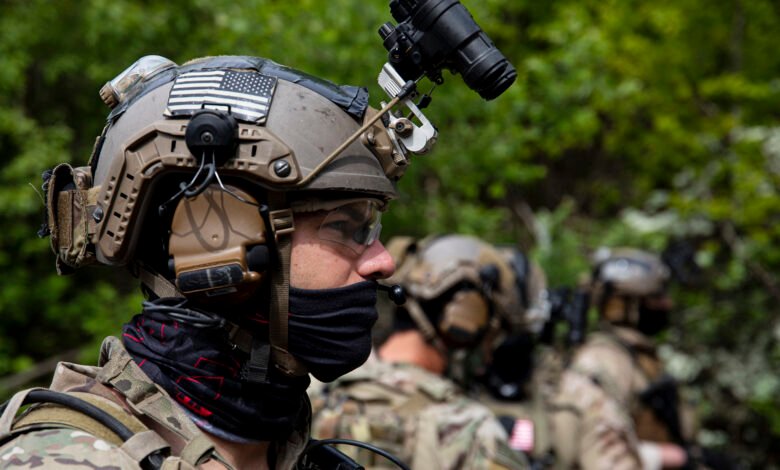
In early 2019, the United States conducted an operation in which SEAL Team Six attempted to plant a covert listening device to intercept North Korean communications regarding high-level nuclear talks between Supreme Leader Kim Jong Un and U.S. President Donald Trump. This classified military operation was authorized during a critical period of diplomatic negotiations between the two nations.
The mission’s primary objective was intelligence gathering through electronic surveillance. The SEALs were tasked with sneaking onto a remote shore in North Korea to install an electronic listening device that would be able to intercept messages from Kim Jong-Un. This type of special operations mission requires extreme precision and stealth capabilities that Navy SEALs are specifically trained to execute.
The Operation Goes Wrong
What began as a carefully planned intelligence operation quickly devolved into a military mission disaster. A squad in black wetsuits landed on the rocky shore at night. The mission did not go according to plan quickly: a North Korean boat appeared, pointing lanterns from the bow at the water. The Navy seals, fearing that they had been discovered, opened fire.
The encounter with North Korean civilians proved fatal. United States Navy SEALs shot and killed several North Korean civilians during a botched mission in 2019 to plant a listening device in the nuclear-armed country. This tragic outcome transformed what was intended as a surveillance mission into a special forces operation failure with deadly consequences.
Historical Context of US Special Forces Mission Failures
Learning From Past Operations
The North Korea incident isn’t an isolated case in the history of American special operations. Military historians have documented numerous instances where special forces missions failed due to various factors including intelligence failures, operational security breaches, and unforeseen circumstances.
Operation Eagle Claw stands as perhaps the most famous example of a failed military operation. Operation Eagle Claw was a failed United States Department of Defense attempt to rescue 53 embassy staff held captive by Revolutionary Iran on 24 April 1980. This mission failure led to significant reforms in special operations capabilities and coordination.
Common Factors in Mission Failures
Several recurring elements contribute to special operations failures:
Intelligence Shortcomings: Inadequate or outdated intelligence often leads to mission compromises. When operators encounter unexpected situations, split-second decisions can have far-reaching consequences.
Communication Breakdowns: Failed communications between different military units or with command structures can result in operational chaos and mission abandonment.
Environmental Challenges: Harsh weather conditions, difficult terrain, or unexpected civilian presence can derail even the most meticulously planned operations.
Political Constraints: Diplomatic considerations and rules of engagement can limit operational flexibility, sometimes leading to mission complications.
The 2019 North Korea Special Forces Mission Details
Operation Planning and Authorization
A Donald Trump-approved plan to send Navy SEALs into North Korea to spy on leader Kim Jong Un led to civilians being killed by U.S. forces. The mission was sanctioned at the highest levels of government during a period of intense diplomatic activity between the United States and North Korea.
The operation involved SEAL Team 6’s Red Squadron, an elite unit within America’s most elite special operations force. The NYT revealed that back in 2019, the U.S. was so hungry for insight into what Kim was thinking, it authorized a secret mission that sent SEALs into North Korea.
Tactical Execution and Complications
The mission’s tactical approach involved maritime insertion, a common method for covert operations in coastal regions. However, the Navy SEALs mission failure occurred when the team encountered unexpected civilian activity in their operational area.
US special forces killed several North Korean fishermen diving for shellfish after encountering them by accident. This civilian encounter fundamentally changed the mission’s trajectory and forced the SEALs to make lethal decisions that were not part of their original operational parameters.
Impact and Consequences of the Failed Special Forces Operation
Diplomatic Ramifications
The failed US special forces mission occurred during a critical period of U.S.-North Korea diplomatic negotiations. A newly revealed U.S. military operation in North Korea in early 2019 failed and the deaths of local civilians, raising questions about Washington’s credibility during a period of high-stakes diplomacy.
This timing made the mission failure particularly problematic, as it potentially undermined ongoing diplomatic efforts between the Trump administration and Kim Jong Un’s government. The operation’s exposure has raised serious questions about operational security and the wisdom of conducting such missions during active diplomatic engagement.
Military and Intelligence Implications
The special operations mission failure has broader implications for U.S. military and intelligence operations. It highlights the risks inherent in conducting covert operations in heavily defended territories and the potential for unintended consequences when missions go wrong.
The incident also demonstrates the challenges faced by special operations forces when encountering civilian populations during covert missions. Rules of engagement and split-second decision-making become critical factors that can determine mission success or failure.
Modern Special Forces Operations and Risk Assessment
Evolution of Special Operations Capabilities
Today’s special operations forces operate in increasingly complex environments where military mission planning must account for numerous variables. The North Korea incident illustrates how even the most elite units can face situations that compromise their missions.
“SOF is floated as a one-size-fits-all solution for a lot of problems,” said one former official. This reliance on special operations capabilities means that mission failures can have disproportionate strategic impacts.
Technology and Intelligence Integration
Modern special forces mission planning incorporates advanced technology and intelligence gathering capabilities. However, the North Korea operation shows that even with sophisticated planning, unexpected encounters can derail missions and create international incidents.
The use of electronic surveillance devices and covert listening equipment represents the cutting-edge of intelligence gathering technology. However, the deployment of such equipment requires successful mission execution, something that proved elusive in this case.
Lessons Learned from US Military Operation Failures
Operational Security Enhancements
The revelation of the failed special forces mission has prompted discussions about operational security improvements. Military planners now emphasize the importance of contingency planning for civilian encounters and unexpected situations during covert operations.
Enhanced training scenarios now include civilian encounter protocols and decision-making frameworks for operators facing split-second choices in hostile territories. These improvements aim to prevent future special operations failures from escalating into international incidents.
Intelligence and Risk Assessment
The North Korea mission failure has reinforced the critical importance of comprehensive intelligence gathering before special forces operations. Understanding local patterns of civilian activity, fishing schedules, and coastal traffic becomes essential for mission success.
Risk assessment protocols now place greater emphasis on civilian population density and activity patterns in target areas. This enhanced focus aims to minimize the likelihood of unplanned encounters that could compromise mission objectives.
The Future of Special Operations Missions
Strategic Considerations
The exposure of the failed US special forces mission has implications for future special operations planning and execution. Military leaders must balance the intelligence value of covert missions against the potential diplomatic and strategic costs of mission failures.
Future special forces mission planning will likely incorporate more extensive diplomatic coordination and political risk assessment. The North Korea incident demonstrates how operational failures can undermine broader strategic objectives and diplomatic initiatives.
Training and Preparation Evolution
Special operations training programs continue to evolve in response to lessons learned from mission failures. Enhanced scenario training now includes more complex civilian encounter situations and decision-making under extreme pressure.
The integration of technology and human intelligence continues to improve special operations capabilities. However, the fundamental challenges of conducting covert operations in hostile territories remain constant, requiring continuous adaptation and improvement.
International Implications of Special Forces Mission Failures
Allied Relations and Cooperation
The revelation of failed military operations can impact relationships with allied nations and international partners. Transparency about mission failures, while potentially embarrassing, can strengthen trust through honest acknowledgment of operational challenges.
International special operations cooperation requires clear communication about risks and potential consequences. The North Korea incident serves as a case study for improving multinational special operations coordination and risk sharing.
Legal and Ethical Considerations
Special forces operation failures raise important questions about legal frameworks governing covert military actions. International law requires careful consideration of civilian protection and proportionality in military operations.
The ethical implications of covert operations in foreign territories continue to generate debate among military ethicists and international law experts. The North Korea incident provides concrete examples for examining these complex issues.
Analysis of Special Operations Risk Factors
Environmental and Geographic Challenges
The North Korean coastal environment presented unique challenges for the special forces mission. Rocky shores, unpredictable weather, and civilian fishing activity created operational complications that contributed to mission failure.
Geographic intelligence and environmental assessment have become more sophisticated since 2019, incorporating real-time civilian activity monitoring and predictive modeling for optimal mission timing and execution.
Human Factors in Mission Success
The psychology of special operations personnel under extreme stress remains a critical factor in mission success or failure. Split-second decisions in high-pressure situations can determine outcomes and create lasting consequences.
Training programs now emphasize stress inoculation and decision-making under pressure, specifically addressing scenarios where operators encounter unexpected civilian populations during covert missions.
Military Mission Planning Improvements
Technology Integration
Advanced satellite imagery and real-time intelligence gathering capabilities have improved special forces mission planning since the 2019 North Korea operation. These technological enhancements aim to reduce the likelihood of unexpected encounters and mission compromises.
Artificial intelligence and machine learning now assist in pattern recognition for civilian activity prediction, helping planners identify optimal insertion times and locations for covert operations.
Communication and Coordination
Enhanced communication protocols between special operations units and command structures have been implemented following analysis of the failed US special forces mission. Real-time situation updates and decision-making support aim to prevent mission escalation.
Improved coordination between intelligence agencies and special operations commands ensures better information sharing and risk assessment before mission authorization and execution.
Conclusion
The 2019 North Korea operation serves as a stark reminder of the risks inherent in special operations and the potential consequences when missions fail. US Navy SEALs shot dead a number of civilians during a botched secret mission to plant a listening device inside North Korea during tense nuclear negotiations, creating a tragic outcome that continues to influence military planning and diplomatic relations.
This failed US special forces mission highlights the complex interplay between military objectives, diplomatic considerations, and operational realities. The incident underscores the importance of comprehensive planning, risk assessment, and contingency preparation in special operations.






